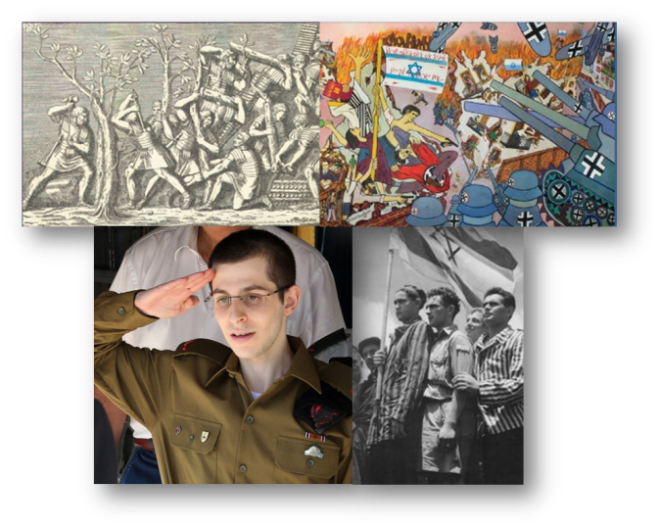Jewish Heroism: Historical Distinctions
May 8, 2013

Top Left: Bar Kochba Rebellion; Top Right: Warsaw Ghetto Uprising;
Bottom Left: Gilad Shalit Returns Home From Captivity; Bottom Right: Survivors Of The Holocaust
Spring is short in Israel: it barely just began and already it's over, as is fall. Soon the rain will wash away the tears of joy shed by millions of Israelis as we celebrated Gilad Shalit's return. Winter lightning and thunder will swallow up the fanfares of the biggest media festival in Israel since the great victory in the Six Day War.
But I am concerned that this festival could turn into a disaster if we do not learn some lessons and draw conclusions. So, just before the story of Gilad Shalit's release moves from the present into the history books, from euphoria to grey, it is important to spend a moment in contemplation.
We want to avoid making a mistake that could seep into the collective Israeli subconscious as the truth, and with a place of honor. It is a young society still trying to find its way on a complex and complicated backdrop.
Gilad Shalit is a Jewish hero. He is not an Israeli hero. It is advisable that we are able to distinguish between these types of heroism, so that we do not confuse them.
Jewish heroism was formulated over two thousand years of exile. It is the heroism of survivors, dwelling in the shadows of darkness and death, under horrific conditions, who decided to continue to exist and, especially, to preserve their sanity.
The theory behind ransoming captives was also formed during those years of exile, when Jews were persecuted and crushed underfoot. There is no other nation that could muster the mental strength to deal with that sort of torture, expulsion and life hanging on a thread. Jewish history turned us into reluctant heroes.
The father of Jewish heroic survival was Rabbi Yohanan ben Zakkai, who asked the Roman general during the 1st century siege on Jerusalem to at least give us "Yavneh and its sages." He chose to save a small group of scholars because he believed they could help the nation of Israel survive after Jerusalem and the temple were destroyed.
Exile heroism expressed itself during the Crusades, the Spanish expulsion, the Chmielnicki Massacre of 1648-9 and through to the days of the unbearable Holocaust of the 20th century. Even under the harshest conditions, Jews maintained their humanity, their faith and their hope for the day when the heroism of the exile would be exchanged for Israeli heroism.
The father of Israeli heroism was Rabbi Akiva. He was a spiritual giant who believed that Jews need to fight and never give up, even when massive empires try to destroy them. He wholeheartedly believed that a nation not ready to give up its life for freedom is a nation that will never recover from a slave mentality.
Israeli heroism was expressed exceptionally during the days of David and Solomon, in the Bar Kochba rebellion, on Massada, in The Warsaw Ghetto Uprising, in the daring souls of the fighters in the underground against the British in Mandate Palestine and the IDF soldiers who have fought in Israel's wars.
Read the full article here.



